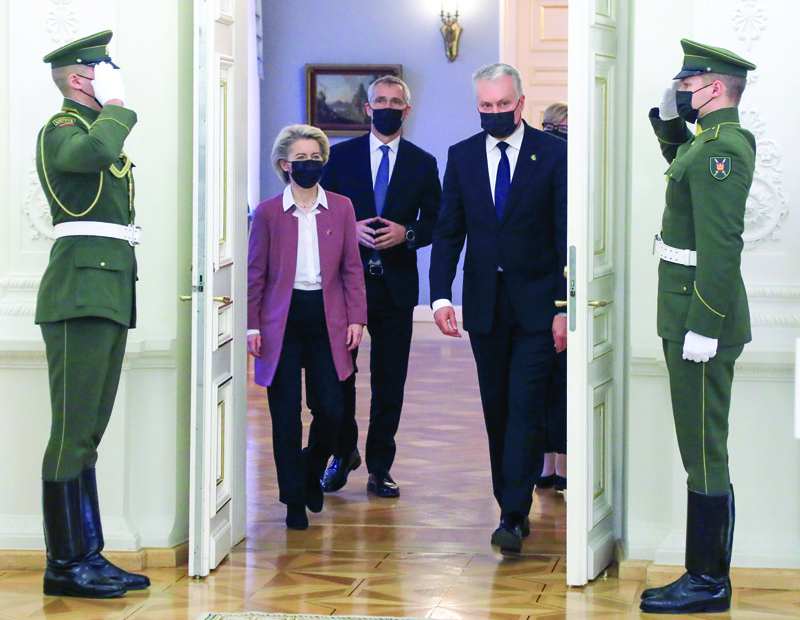 VILNIUS, Lithuania: (Left to right) European Commission President Ursula von der Leyen, NATO Secretary-General Jens Stoltenberg and Lithuania's President Gitanas Nauseda enter the room to address a joint press conference after their meeting in Vilnius, Lithuania, yesterday.-AFP
VILNIUS, Lithuania: (Left to right) European Commission President Ursula von der Leyen, NATO Secretary-General Jens Stoltenberg and Lithuania's President Gitanas Nauseda enter the room to address a joint press conference after their meeting in Vilnius, Lithuania, yesterday.-AFP
VILNIUS, Lithuania: EU and NATO leaders yesterday vowed to step up cooperation against hybrid threats on a visit to Lithuania dominated by talks on the Belarus migrant crisis and Russia's military build-up near Ukraine. NATO Secretary General Jens Stoltenberg also repeated his call on Russia to "de-escalate" its military build-up on the border with Ukraine and warned of "costs and consequences" if it used force.
The visit by Stoltenberg and European Commission chief Ursula von der Leyen comes ahead of a meeting of NATO foreign ministers including US Secretary of State Antony Blinken in Latvia this week. Stoltenberg and von der Leyen both accused Belarus of orchestrating the migrant crisis on its border as a "hybrid" threat against the European Union-a charge that the regime has denied.
A hybrid threat is a security challenge combining traditional military means and non-military tactics such as disinformation. "To respond to such events, it is important that the European Union and NATO work hand in hand," von der Leyen said at a joint press conference with Stoltenberg and Lithuanian leaders. Stoltenberg said: "We discussed how we could step up our joint work between NATO and the EU including through a new joint declaration because we are stronger and safer when we work together".
Thousands of migrants-mostly from the Middle East-have crossed or tried to cross the Belarus border in recent months into the eastern members of the EU and NATO: Latvia, Lithuania and Poland. Referring to the situation on the Belarus border, Lithuanian President Gitanas Nauseda said that "if the security situation gets even worse, we do not rule out consultations under NATO's Article 4."
Under NATO's founding treaty, any member can convene a meeting of NATO to consult when it feels its security or independence are threatened. Poland has also warned it may invoke this article. The two-day meeting of NATO foreign ministers starting in neighboring Latvia tomorrow is set to be dominated by concern about Russia's military build-up near the border with Ukraine.
Stoltenberg said the "unusual" build-up of tanks, artillery, drones and thousands of combat-ready troops was "very concerning for many reasons", also "because it is unprovoked and unexplained". "The message to Russia is that they should de-escalate, reduce tensions and be transparent" he said, adding that "if they decide to use force, then of course, there will be consequences". - AFP
.jpg)









